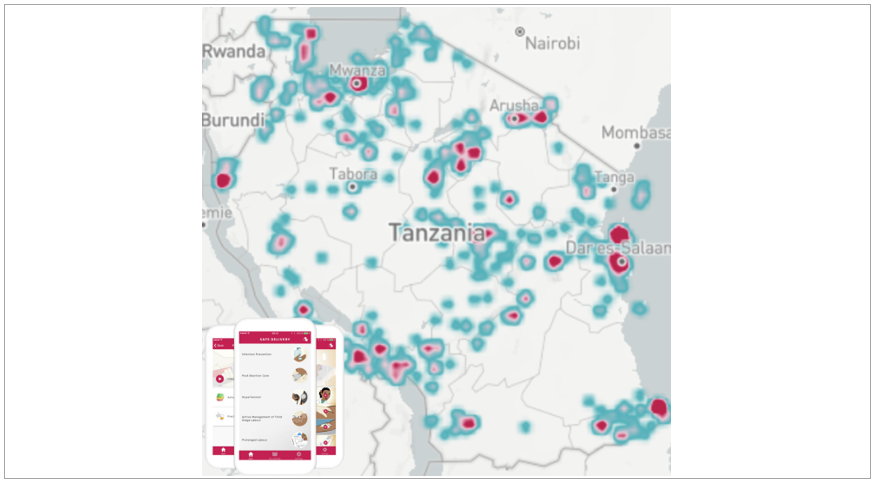
IMPACT: Ifakara, partners scale up Safe Delivery App in Tanzania

Ifakara Health Institute and the Maternity Foundation in Denmark, in partnership with the Ministry of Health (MOH) and State Ministry President’s Office Regional Administration and Local Government (PO-RALG), have successfully introduced and expanded the use of the Safe Delivery App (SDA) in all regions in Tanzania.
The App is a smartphone application, available in both English and Swahili languages, that gives skilled birth attendants direct and immediate access to evidence-based and current clinical guidelines for basic emergency obstetric and neonatal care (BEmONC). The app also includes a related essential preventive protocol that supports their daily work.
Tanzania is among countries with some of the highest rates of maternal and newborn mortality, with the recent Tanzania Demographic Health Survey (TDHS) estimating them at 556 per 100,000 live births and neonatal mortality at 24 per 1000 live births.
Despite joint efforts by the government, civil society, and international agencies to address these devastating rates, the challenge persists. In light of this, the App is a practical, efficient, and innovative tool that helps healthcare providers get the training and support they need to enhance maternal and child healthcare services in the country.
App modules, essential features
The App comprises 13 content modules addressing critical interventions in childbirth emergencies and preventative procedures, all aligned with international and Tanzanian clinical guidelines.
These modules cover infection prevention, post-abortion care, hypertensive disorders in pregnancy, active management of the third stage of labor, prolonged labor, post-partum hemorrhage, manual removal of the placenta, maternal sepsis, neonatal resuscitation, new-born management, COVID-19 in the maternal and child health context, and female genital mutilation.
The App has five essential features to guide health workers: animated instruction videos, action cards, drug lists, practical procedures, and a personalized e-learning component (MyLearning). All features and functionalities are designed for low-literacy, low-income settings and can function offline after being downloaded. Healthcare workers can use the App on the job, in their free time, or as part of their training.
Pilot study held in Mpwapwa between 2016-18
The App was scaled up after a pilot study that was carried out in the Mpwapwa district between 2016 and 2018. The study assessed the feasibility of using the App to improve the provision of maternal and newborn health care in the Mpwapwa district in Dodoma, Tanzania.
Significant and reassuring lessons were acquired from this pilot project, which sparked interest among stakeholders to further investigate the value, necessity, and potential of the App for health workers and midwives in Tanzania.
Efforts to enhance the effectiveness and efficiency of the App for the target users involved improving the accuracy and relevance of the content (animated messages) as well as the communication side of it. This involved getting users' (health workers') views through a survey and getting expert opinions and insights on the clinical content from the Paediatric Association of Tanzania (PAT), the Association of Gynaecologists and Obstetricians of Tanzania (AGOTA), the Tanzania Midwives Association of Tanzania (TAMA), and a team of experts from the Ministry of Health of Tanzania.
After a rigorous review and adaptation of the clinical content of the App by the Ifakara Health Institute clinical team led by Dr. John Kilambo, the Clinical Coordinator, and all the experts from the technical associations and the Ministry, Tanzania’s versions of the App – available in Swahili and English – were approved by the Ministry of Health in 2021.
The app first introduced in Tanzania in 2021
The App was officially launched on November 19, 2021, by Dr. Grace Magembe, then Deputy Permanent Secretary for Health in the President’s Office, Regional Administration, and Local Government, and Ambassador Mette Nrgaard Dissing-Spandet of the Royal Danish Embassy in Tanzania, during the MoH RMNCAH Annual Scientific Conference.
Following the launch, the Ifakara team, led by Donat Shamba, the Project Coordinator, Dr. John Kilambo, the Clinical Coordinator, and Mary Ramesh, a Social Scientist, worked with the MoH and the PO-RALG to successfully implement the Safe Delivery App project nationwide in Tanzania.
Their efforts included training over 600 health managers and healthcare workers and equipping them with the Safe Delivery App to enhance their knowledge and skills in maternal and child healthcare services and improve quality across the country.
As a result of these concerted efforts, the Safe Delivery App has gained significant traction and recognition. Presently, there are about 7,605 app users across Tanzania, serving as a testament to its effectiveness and value in the healthcare sector.
App accredited by professional bodies
Recognizing the App's impact and contribution to professional development, the Tanzania Nursing and Midwifery Council (TNMC) recently granted official accreditation to the Safe Delivery App for Continuing Professional Development (CPD).
This noteworthy accreditation signifies that nurses and midwives throughout Tanzania can now leverage the App's educational resources. They can study its comprehensive clinical content, engage in quizzes, tests, and exams, and upon successful completion, earn CPD points, furthering their professional growth and ensuring the delivery of high-quality healthcare services.
Researchers at the Ifakara and the Maternity Foundation continue monitoring and evaluating to document the project's progress and ensure that lessons learned and best practices are preserved. As a result, the App's users will receive the highest quality of support.
The project's success was made possible by funding from the Danish International Development Agency (DANIDA) through the Royal Danish Embassy in Tanzania. The Danish Embassy's active participation exemplifies the significance of international cooperation in driving positive change and enhancing healthcare outcomes in Tanzania.
